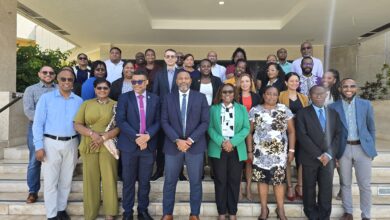MONTEGO BAY, JAMAICA – Caribbean Ministers with responsibility for trade met with United States Trade Representative (USTR) Robert Zoellick and World Trade Organization (WTO) Director-General Supachai Panitchapdi in Montego Bay, Jamaica on June 2 and 3, respectively, during the Twenty-Fourth Meeting of CARICOM Heads of Government, convened July 2 to 5. Both sessions were chaired by Chairman of COTED and Deputy Prime Minister and Minister of Trade of St. Kitts & Nevis, Hon. Sam Condor. Hon. K.D. Knight, Minister of Foreign Affairs and Trade, Jamaica, who has lead responsibility at Ministerial level in CARICOM for the Free Trade Area of the Americas (FTAA), led Ministers and their Delegations in an exchange-of-views on the FTAA, June 2. Ambassador Zoellick provided US perspectives on three areas: the FTAA, WTO Doha negotiations and capacity building. CARICOM Ministers highlighted the region’s concerns and interests across these areas. Both CARICOM Ministers and Ambassador Zoellick reiterated their respective countries’ commitment to the FTAA. Both sides outlined the elements of what would be a ‘pragmatic and good base-line FTAA agreement’. Ambassador Zoellick highlighted the importance of the informal Ministerial dialogue that took place at Wye River, Maryland, June 12 to 13. He noted that it brought select Ministers together to take stock of the FTAA process and to begin to outline a framework for the hemispheric trade pact, in advance of a Ministerial Meeting in Miami this November. He added, that the FTAA will require customizing to certain groups, like CARICOM, but not at the expense of a comprehensive effort. On the WTO, both sides noted the deadlock in Doha Round negotiations. They focused particular attention on such key issues as: special and differential treatment (S&DT), access to low cost medicines, agriculture, market access for non-agricultural goods, dispute settlement and services. Caribbean Regional Negotiating Machinery (RNM) Director-General, Ambassador Dr. Richard Bernal, highlighted the significant importance of dispute settlement and services for the small economies of the Caribbean. In the case of the former, he noted that the small size of countries in the region made the issue of particular relevance. On the latter, the Ambassador lamented the lack of any tangible and meaningful offers in the so-called Mode IV or temporary movement of natural persons. CARICOM Ministers and Ambassador Zoellick also agreed that the Hemispheric Cooperation Programme (HCP) has to be a key element of FTAA negotiations in order to advance their development focus. Minister Knight indicated that it was the sentiment of CARICOM Ministers that S&DT has to be effectively incorporated into each FTAA chapter. To assist in the implementation and adjustment needs of the small economies of the region, regarding the FTAA, the importance of a Regional Integration Fund was also highlighted to Ambassador Zoellick. The July 3 meeting of Ministers, with the WTO Director-General, evaluated areas of deadlock in the on-going Doha Agenda. In reviewing prospects for a successful Fifth WTO Ministerial Conference, which marks the half-way mark in multilateral trade talks launched November 2001, Ministers – through Hon. Clement Rohee, Minister with responsibility for WTO matters at Ministerial level in CARICOM and Minister of Trade, Guyana – reviewed areas that would need to be resolved before and during Cancun to increase the likelihood of a successful Ministerial. In this regard, resolving the impasse that exists in agriculture was raised as an area of critical importance. The implications of the European Union’s reform of its Common Agricultural Policy (CAP), revealed earlier this week, figured prominently in this context. Ministers were especially concerned about relaying to the WTO Director-General issues of transparency in WTO processes, especially at the Cancun meeting. Panitchapdi indicated he was discussing these matters with WTO members. “This is being refined and is still under consultation”, he said. The absence of meaningful concessions on the part of the developed countries in their services offers were also outlined as matters of importance to the region. CARICOM Ministers stressed, to the WTO Director-General, that it was in this area the region stood to gain significantly. Small economies were also highlighted as a key area of concern for the Caribbean in the Doha work programme. “Special and differential treatment for small developing countries in particular small island developing states is an issue which must be addressed in all areas of the Doha Agenda”, said the RNM chief, Ambassador Dr. Richard Bernal. The Ambassador concluded, “concessions to small developing economies do not disrupt disciplines of world trade because their share of world trade is minute”. The CARICOM team of Ministers also stressed that there is a special and acute need for technical assistance and trade capacity building in small economies. The following CARICOM countries were represented at Ministerial level at the July 2 meeting: Bahamas, Barbados, Belize, Guyana, Jamaica, St. Kitts & Nevis, St. Lucia, St. Vincent & Grenadines, and Trinidad & Tobago. At the July 3 meeting the following Caribbean countries were represented at Ministerial level: Barbados, Belize, Cuba, Guyana, Jamaica and St. Lucia. In both bilateral meetings, July 2 and 3, respectively, RNM Director-General, Ambassador Dr. Richard Bernal, and RNM Senior Director, Mr. Henry Gill and a technical complement of RNM staff provided support to the Ministerial team. CARICOM Heads of Government, led by Most Hon. P.J. Patterson, Prime Minister of Jamaica and Chairman of the CARICOM Prime Ministerial Sub- Committee (PMSC) on External Negotiations, also met with the WTO Director- General at a working lunch, July 3. They expressed their concern at the deadlock that has characterized key areas of the Doha Agenda. Heads underscored the ‘crucial role’ of S&DT to the Caribbean and stressed the importance of the small economies issue to the region. Panitchapdi briefed the Heads of State on what areas of impasse in global trade talks would have to be resolved prior to and at the Fifth WTO Ministerial Conference. For More Information Contact: Nand C. Bardouille Tel: (246) 430-1678 email: nand.bardouille@crnm.org
News Letter
Subscribe to our mailing list to get the new updates!
Check Also
Close





